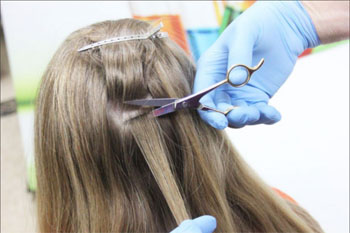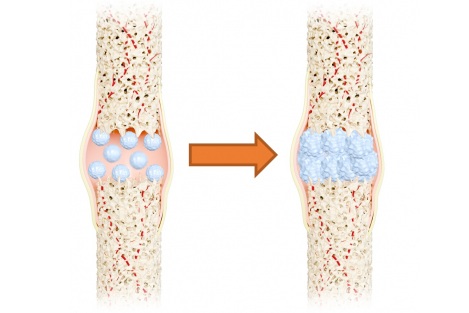Cortisol Levels in Hair Can Predict IVF Success
|
By HospiMedica International staff writers Posted on 04 Nov 2016 |

Image: New research indicates the levels of cortisol in hair could predict IVF success (Photo courtesy of SPL).
Elevated levels of the stress hormone cortisol in hair can significantly predict the likelihood of pregnancy in women undergoing in vitro fertilization (IVF) treatment, according to a new study.
Researchers at the University of Nottingham (United Kingdom) conducted a study involving 135 women (mean age 34.5 years) recruited from a fertility clinic in Nottingham (United Kingdom) between December 2012 and April 2014; following IVF treatment, 60% of the women became pregnant. Salivary cortisol samples were collected over two days, on waking, 30 minutes after waking, and at 10 pm at night; 88 women also provided hair samples for the measurement of cortisol.
After analyzing both types of cortisol data, the researchers found that short-term salivary cortisol measurements were not related to pregnancy results. In contrast, 27% of the variance in pregnancy outcome was accounted for by hair cortisol concentrations, after controlling for other known factors linked to IVF success such as age, body mass index (BMI), number of eggs retrieved, and number of eggs fertilized. The study was published on August 30, 2016, in Psychoneuroendocrinology.
“We know that many factors will influence the likelihood of IVF success and, at this stage, we do not fully understand all of the factors that influence whether treatment works or not. However, optimizing patient’s chances of IVF success is key, and this research suggests that reducing cortisol in the months prior to treatment may play an important part in conception,” concluded lead author Adam Massey, MD. “The good news for patients is that well known lifestyle changes may help to lower cortisol and therefore optimize the likelihood they will get pregnant.”
“Researchers have been interested in the role that cortisol may play in determining reproductive outcomes for some time now, not least because cortisol is typically elevated in relation to stress,” said senior author Kavita Vedhara, PhD, of the division of primary care. “While these results do not specifically implicate stress, they do provide preliminary evidence that long term cortisol levels are associated with a reduced likelihood of conceiving. A range of factors is likely to account for that, stress being one possibility.”
Cortisol is a well-known stress hormone, and until recently could only be measured within a short time span. But by measuring levels in about 100 strands of hair clipped from the scalp, cortisol levels can be assessed as a retrospective biological indicator of stress over the past three months, indicating chronic or accumulated stress. Studies have also demonstrated interactions with factors associated with health disparities such as racial/ethnic identity, sex, and socioeconomic status (SES).
Related Links:
University of Nottingham
Researchers at the University of Nottingham (United Kingdom) conducted a study involving 135 women (mean age 34.5 years) recruited from a fertility clinic in Nottingham (United Kingdom) between December 2012 and April 2014; following IVF treatment, 60% of the women became pregnant. Salivary cortisol samples were collected over two days, on waking, 30 minutes after waking, and at 10 pm at night; 88 women also provided hair samples for the measurement of cortisol.
After analyzing both types of cortisol data, the researchers found that short-term salivary cortisol measurements were not related to pregnancy results. In contrast, 27% of the variance in pregnancy outcome was accounted for by hair cortisol concentrations, after controlling for other known factors linked to IVF success such as age, body mass index (BMI), number of eggs retrieved, and number of eggs fertilized. The study was published on August 30, 2016, in Psychoneuroendocrinology.
“We know that many factors will influence the likelihood of IVF success and, at this stage, we do not fully understand all of the factors that influence whether treatment works or not. However, optimizing patient’s chances of IVF success is key, and this research suggests that reducing cortisol in the months prior to treatment may play an important part in conception,” concluded lead author Adam Massey, MD. “The good news for patients is that well known lifestyle changes may help to lower cortisol and therefore optimize the likelihood they will get pregnant.”
“Researchers have been interested in the role that cortisol may play in determining reproductive outcomes for some time now, not least because cortisol is typically elevated in relation to stress,” said senior author Kavita Vedhara, PhD, of the division of primary care. “While these results do not specifically implicate stress, they do provide preliminary evidence that long term cortisol levels are associated with a reduced likelihood of conceiving. A range of factors is likely to account for that, stress being one possibility.”
Cortisol is a well-known stress hormone, and until recently could only be measured within a short time span. But by measuring levels in about 100 strands of hair clipped from the scalp, cortisol levels can be assessed as a retrospective biological indicator of stress over the past three months, indicating chronic or accumulated stress. Studies have also demonstrated interactions with factors associated with health disparities such as racial/ethnic identity, sex, and socioeconomic status (SES).
Related Links:
University of Nottingham
Latest Patient Care News
- Revolutionary Automatic IV-Line Flushing Device to Enhance Infusion Care
- VR Training Tool Combats Contamination of Portable Medical Equipment
- Portable Biosensor Platform to Reduce Hospital-Acquired Infections
- First-Of-Its-Kind Portable Germicidal Light Technology Disinfects High-Touch Clinical Surfaces in Seconds
- Surgical Capacity Optimization Solution Helps Hospitals Boost OR Utilization

- Game-Changing Innovation in Surgical Instrument Sterilization Significantly Improves OR Throughput
- Next Gen ICU Bed to Help Address Complex Critical Care Needs
- Groundbreaking AI-Powered UV-C Disinfection Technology Redefines Infection Control Landscape
- Clean Hospitals Can Reduce Antibiotic Resistance, Save Lives
- Smart Hospital Beds Improve Accuracy of Medical Diagnosis
- New Fast Endoscope Drying System Improves Productivity and Traceability
- World’s First Automated Endoscope Cleaner Fights Antimicrobial Resistance
- Portable High-Capacity Digital Stretcher Scales Provide Precision Weighing for Patients in ER
- Portable Clinical Scale with Remote Indicator Allows for Flexible Patient Weighing Use
- Innovative and Highly Customizable Medical Carts Offer Unlimited Configuration Possibilities
- Biomolecular Wound Healing Film Adheres to Sensitive Tissue and Releases Active Ingredients
Channels
Critical Care
view channel
Origami Robots to Deliver Medicine Less Invasively and More Effectively
Delivering medicine to ulcers or other internal sites often requires invasive procedures that can disrupt surrounding tissues and lengthen recovery times. Traditional magnetic actuators used in soft robotics... Read more
Improved Cough-Detection Technology Aids Health Monitoring
Coughing serves as an important biomarker for tracking a variety of conditions and can help monitor the progress of respiratory diseases or predict when someone’s asthma is being exacerbated.... Read moreSurgical Techniques
view channel
Novel Glue Prevents Complications After Breast Cancer Surgery
Seroma and prolonged lymphorrhea are among the most common complications following axillary lymphadenectomy in breast cancer patients. These postoperative issues can delay recovery and postpone the start... Read more
Breakthrough Brain Implant Enables Safer and More Precise Drug Delivery
Delivering medication directly to specific regions of the brain has long been a major challenge in treating neurological disorders. Current implants and infusion systems typically reach only one or two... Read moreHealth IT
view channel
Printable Molecule-Selective Nanoparticles Enable Mass Production of Wearable Biosensors
The future of medicine is likely to focus on the personalization of healthcare—understanding exactly what an individual requires and delivering the appropriate combination of nutrients, metabolites, and... Read moreBusiness
view channel
Philips and Masimo Partner to Advance Patient Monitoring Measurement Technologies
Royal Philips (Amsterdam, Netherlands) and Masimo (Irvine, California, USA) have renewed their multi-year strategic collaboration, combining Philips’ expertise in patient monitoring with Masimo’s noninvasive... Read more
B. Braun Acquires Digital Microsurgery Company True Digital Surgery
The high-end microsurgery market in neurosurgery, spine, and ENT is undergoing a significant transformation. Traditional analog microscopes are giving way to digital exoscopes, which provide improved visualization,... Read more
CMEF 2025 to Promote Holistic and High-Quality Development of Medical and Health Industry
The 92nd China International Medical Equipment Fair (CMEF 2025) Autumn Exhibition is scheduled to be held from September 26 to 29 at the China Import and Export Fair Complex (Canton Fair Complex) in Guangzhou.... Read more









.jpg)






